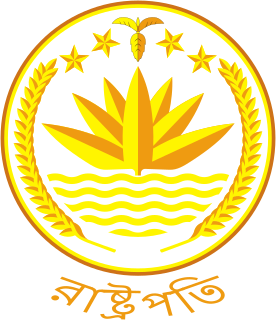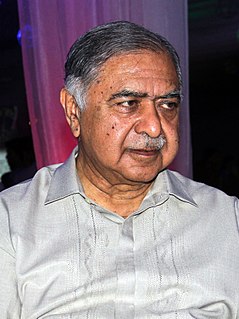
Lt. General Ziaur RahmanHJ, was a Bangladeshi military officer and politician who served as the President of Bangladesh from 1977 to 1981. He was assassinated on 30 May 1981 in Chittagong in an army coup d'état.
The Bangladesh Nationalist Party is a centre-right to right-wing nationalist, political party in Bangladesh and one of the major political parties of Bangladesh. It was founded on 1 September 1978 by former Bangladeshi President Ziaur Rahman after the Presidential election of 1978, with a view of uniting the people with a nationalist ideology. Since then, the BNP won the second, fifth, sixth and eighth national elections and two Presidential elections in 1978 and 1981. The party also holds the record of being the largest opposition in the history of parliamentary elections of the country, with 116 seats in the seventh national election of June 1996. It has currently 7 MPs in parliament after 2018 general election. Although the party was initially founded on a nationalistic principle, many of its leaders want an Islamic government and its main supporters are Islamists.

The president of Bangladesh officially the President of the People's Republic of Bangladesh is the head of state of Bangladesh and commander-in-chief of the Bangladesh Armed Forces.
Shah Azizur Rahman was a Bangladeshi politician who served as the Prime Minister of Bangladesh. However, he was the subject of considerable controversy for his collaboration with the Pakistan Army against the struggle to Independence of Bangladesh.

Bangladesh has undergone several changes of government since its independence. Between the first recorded uprising in August of 1975 and the last known attempt in December of 2011, Bangladesh has been through as many as 29 military Coups.

Syed Faruque Rahman was a coup member involved in toppling the Sheikh Mujib regime in Bangladesh. He was convicted and hanged on 28 January 2010 along with co-conspirators Sultan Shahriar Rashid Khan, A.K.M. Mohiuddin Ahmed, Mohiuddin Ahmed, and Mohammad Bazlul Huda in Dhaka Central Jail, Old Dhaka, for the murder of Sheikh Mujibur Rahman, the founder and first President of Bangladesh. Sayed Faruque Rahman and his close ally Kahandaker Abdur Rashid were the chief organisers of the assassination of Sheikh Mujibur Rahman on 15 August 1975. He was 2IC of the 1st Bengal Lancers Regiment of the Bangladesh Army who led a group of junior army officers in-order to overthrew the regime of Sheikh Mujibur Rahman and installed Khondaker Mushtaque Ahmed as President of Bangladesh.
Mohammad Ziaur Rahman is a first-class and List A cricketer from Bangladesh. He is a right-handed batsman and right arm fast medium bowler. He is known as the "Hit man" of Bangladesh cricket team for hitting sixes in every game.
1981 (MCMLXXXI) was a common year starting on Thursday of the Gregorian calendar, the 1981st year of the Common Era (CE) and Anno Domini (AD) designations, the 981st year of the 2nd millennium, the 81st year of the 20th century, and the 2nd year of the 1980s decade.
1979 (MCMLXXIX) was a common year starting on Monday of the Gregorian calendar, the 1979th year of the Common Era (CE) and Anno Domini (AD) designations, the 979th year of the 2nd millennium, the 79th year of the 20th century, and the 10th and last year of the 1970s decade.

Shaheed Ziaur Rahman Medical College is a government medical school in Bangladesh, established on 5 November 1992. It is located in Bogra town. It is affiliated with the Rajshahi Medical University.
Bangladeshi nationalism is an ideology that promotes the territorial identity of Bangladeshis. The ideology emerged during the late 1970s, popularized by former Bangladesh President Ziaur Rahman. The history of nationalism in the country dates back to the colonial era, when the region started witnessing anti-colonial movements against the British Empire. Soon, a sense of religious nationalism began to emerge which was later revolutionised into ethnolinguistic nationalism. Following independence of Bangladesh in 1971, leaders like Ziaur Rahman began to promote Bangladeshi nationalism which was based on territorial attachment of Bangladeshis. Politically, Bangladeshi nationalism is mainly professed by the center-right and rightist political parties in Bangladesh, led by Bangladesh Nationalist Party.
Ziaur Rahman (1936–1981) was the President of Bangladesh from 1976 until 1981.
The 1982 Bangladeshi military coup d'état deposed the civilian government headed by the President of Bangladesh Abdus Sattar and brought to power the Chief of Army Staff of the Bangladesh Army Lt. Gen. Hussain Muhammad Ershad. After serving initially as the Chief Martial Law Administrator, Ershad assumed the post of president in 1983 and ruled until 1990.

Presidential elections were held in Bangladesh on 3 June 1978. They were the first direct elections for the presidency, as the president had previously been elected by the Jatiya Sangsad. The result was a victory for Ziaur Rahman, who received 76.6% of the vote. Turnout was 54.3%.

Presidential elections were held in Bangladesh on 15 November 1981. The result was a victory for the incumbent acting President Abdus Sattar of the Bangladesh Nationalist Party (BNP), who received 65.5% of the vote, beating his principal challenger Kamal Hossain of the Awami League. Voter turnout was 56.5%.
The 7 November 1975 Bangladesh coup d'état was a coup d'état launched by left-wing army personnel in collaboration with left-wing politicians from Jatiya Samajtantrik Dal. The coup killed Major General Khaled Mosharraf, who had himself led a coup against those involved in the assassination of Sheikh Mujibur Rahman. The coup also freed Ziaur Rahman from house arrest and allowed him to eventually seize power and become president.
Since the independence of Bangladesh, the presidential election process has been changed several times due to both the Presidential and Parliamentary arrangements. According to the Second Schedule to the Constitution of 1972, the president of the parliament used to be elected by a secret vote. Later, according to the fourth amendment to the constitution, the provision of the direct election system of presidential election was introduced. But soon after 12th Amendment to the Constitution, the provision of presidential elections through an indirect election was introduced after the parliamentary system was installed. At present, President is elected by an indirect election by the members of parliament as per Article 48 of the Constitution.
On 17 June 1980, a coup d'état against President Ziaur Rahman of Bangladesh failed, resulting in the deaths of a few hundred army officers and enlisted men.

Lt. General Ziaur Rahman Bir Uttom's tenure as President of Bangladesh started with his acquisition of the presidency from Abu Sadat Mohammad Sayem on April 21, 1977, after the latter resigned from his position on health grounds.










